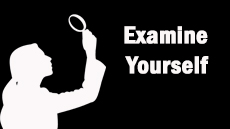Natural Selection
Evolution Never Happened | See All The Videos. Go to the: 30 Second Video Menu

Evolution is based on random mutations and natural selection. It is supposed that natural selection "chooses" those mutations that are beneficial, causing organisms to evolve and improve. However, that gives the impression that natural selection can do more than it actually can do.
It is important to realize that natural selection can only destroy. That's the only tool in it's toolbox... death. Natural selection cannot create new characteristics or traits. It can only work with what already exists. Natural selection can not guide the direction of mutations. Natural selection cannot create new information, new genes or new proteins. All that natural selection can do is kill off organisms that are not fit for the environment in which they are living.
Also, natural selection is blind. Not only blind to the future -- natural selection cannot preserve a feature that is not useful now, but will be useful in the future -- but also blind to the present. For example, natural selection cannot notice that the climate is cooler, and guide the organism to grow more fur. Natural selection is blind, lacking intelligence, and without foresight. All it can do is kill.
A web page on evolution for the University of California at Berkley, a very pro evolution institution, states:
]Mutations can be beneficial, neutral, or harmful for the organism, but mutations do not "try" to supply what the organism "needs." Factors in the environment may influence the rate of mutation but are not generally thought to influence the direction of mutation. For example, exposure to harmful chemicals may increase the mutation rate, but will not cause more mutations that make the organism resistant to those chemicals. In this respect, mutations are random — whether a particular mutation happens or not is unrelated to how useful that mutation would be.
For example, in the U.S. where people have access to shampoos with chemicals that kill lice, we have a lot of lice that are resistant to those chemicals. There are two possible explanations for this:
A. Resistant strains of lice were always there — and are just more frequent now because all the non-resistant lice died a sudsy death.
B. Exposure to lice shampoo actually caused mutations for resistance to the shampoo.Scientists generally think that the first explanation is the right one and that directed mutations, the second possible explanation relying on non-random mutation, is not correct.
In other words "evolution" is blind. Mutations happen randomly and natural selection can not provide direction nor guidance.
I'd like to note two things at this point: While mutations can be beneficial, that does not mean they are not at the same time destructive. Benefits are typically short-term, and come at the expense of a loss of information (something gets broken). So the overall fitness direction is still downward. Secondly, there are non-random mutations that are 100% beneficial (no loss of information). Living organisms are pre-programmed to respond to some types of changes in the environment, with inheritable changes to their genome. These types of mutations can be distinguished from random mutations because, when a group of organisms are placed under a certain stress, they all quickly mutate in exactly the same way. This is repeatable with additional groups of the organism.
To Conclude, An Example:
In his book "Darwin Devolves," Michael Behe uses an analogy similar to this: Suppose we want to get to the top of a mountain that is 100 miles away. We are blind and deaf. What we do is to take a random step in a random direction. If, with that step we stay on the level, or go uphill, we keep that step. If that step takes us downhill, then we step back (undo the step). Then repeat the process. This is what natural selection does. Going uphill in this case, is a benefit. Staying level is neutral, neither harmful nor beneficial. Going downhill is detrimental, and so that step is eliminated. Will we make it to the top of the mountain? No. Not even close. We will "arrive" at the top of a small hill and not go any further. That's what natural selection does.

Many people, when they die, will stand before Jesus and say:
Lord, Lord, did we not prophesy in Your name, and in Your name cast out demons, and in Your name perform many miracles? - Matthew 7:22
And Jesus will say to them:
I never knew you; depart from Me, you who practice lawlessness. - Matthew 7:23
Get your Bible out and read Matthew 7:21-23. These are some of the most frightening verses in the Bible.
They describe people who believe with all their heart that they are saved. They have no doubt that they know Jesus and they've done many great things that prove this is true. Put Jesus says, 'Depart from me...' He doesn't know them.
Are you truly trusting Jesus? Scripture says to examine yourself to see if you are in the faith (2 Corinthians 13:5). Have you done that?
Do you read your Bible regularly? Do you fear false teaching? Are you growing in your obedience to God? Are you growing in your understanding of what God wants? Do you regularly share the good news about Jesus with others?